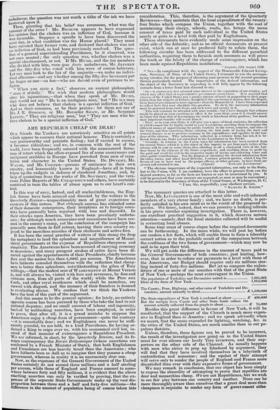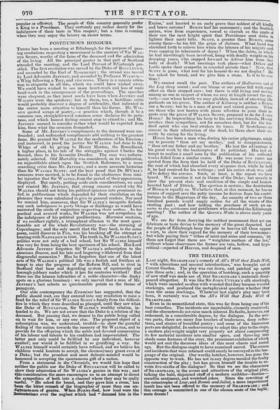ARE REPUBLICS CHEAP OR DEAR?
Oua friends the Yankees are notoriously sensitive on all points which appear to concern their national honour. This is certainly a very praiseworthy and patriotic feeling; but if carried to excess, it becomes ridiculous; and we, in common with the rest of the world, have been frequently amused with the unmeasured fierce- ness of retort which the often-exposed lies of some anonymous and malignant scribbler in Europe have provoked from men of repu- tation and character in the United States. Dr. DWIGHT, Mr. WaLsii, and Mr. Coorert—persons of eminence in their own country, and honourably known in England—have all in turns taken up the cudgels in defence of slandered Jonathan; and, by help of quotations from the works of Dr. SOUTHEY, and the vera- cious Police Reports of Mr. COLQUHOUN and others, have certainly contrived to turn the tables of abuse upon us to our heart's con- tent.
In this war of envy, hatred, and all uncharitableness, the Eng- lish forces have been arrayed and directed by the writers in the Quarterly Review—unquestionably men of great experience in contests of this nature. But although success has attended some of their domestic enterprises, their irruptions as to foreign coun- tries have generally been repulsed with loss and discredit. In their attacks upon America, they have been peculiarly unfortu- nate; for although much annoyance and uneasiness have been cre- ated in the enemy's camp, yet the conclusion of the campaign has generally seen them in full retreat, leaving their own country ex- posed to the merciless missiles of their obstinate and active foes. It has been the usual practice of writers of this stamp (to drop the metaphor) to laud the splendour and magnificence of Monar- chical governments at the expense of Republican cheapness and simplicity. The Americans have been accused of carrying economy to meanness; and many pungent strokes of satire have been di- rected against the appointments of their Presidents, chiefly because they cost the nation less than 6,000/. per annum. The Americans have hitherto consoled themselves with the reflection that cheap- ness is better than splendour, notwithstanding the gibes of Tory witlings,—that the modest seat of WASHINGTON at Mount Vernon is, and will always be, visited with love and reverence, by free and virtuous men, from all parts of the world; while the Parc aux Cerfs, and other royal residences which shall be nameless, are viewed with disgust, and the memory of their founders is doomed to everlasting shame. We confess that we think the Yankees have the best of this part of the argument. And this Seems to be the general opinion; for lately, an entirely Opposite course has been pursued by those who take the lead in our national disputes; and no small amount of labour and ingenuity, backed by unblushing assertion, have been employed, in order to prove, that after all, it is a grand mistake to suppose the Americans enjoy a cheap form of government—quite the contrary is remarkably dear; and we Englishmen can never be suffi- ciently grateful, we are told, to a kind Providence, for having or- dained a King to reign over us, with his economical civil list, in- stead of that monster of extravagance a Republican President. 'We are informed, in short, by the Quarterly Review, and its fo- reign contemporary the Revue Britannique (whose assertions are confirmed by a French Minister of State), that both Englishmen and Frenchmen are less heavily taxed than the Americans ; who have hitherto been so dull as to imagine that they possess a cheap government, whereas in reality it is an enormously dear one. Now, as the expenses Of the General Government of the United States certainly do not exceed three millions and a half sterling per annum, while those of England and France amount to some- where between forty and fifty millions, it is evident that the above' startling assertion can only be verified by proving, that the ex- penses of the separate State Governments make up the vast dis- proportion between three and a half and forty-five millions—the difference in the amount of population being of course taken into 0 consideration. This, therefore, is the argument of the Quarterly Reviewers—they maintain that the local expenditure of the twenty- four States which compose the Union, together with the cost of maintaining their clergy, schools, roads, &e. brings the mean amount of taxes paid by each individual in the United States nearly or quite to a level with that paid by Englishmen.
These statements have evidently made some impression on the other side of the Atlantic; and as no official documents at present exist, which can at once be produced fully to refute them, the following circular has been addressed to the different parochial authorities, requiring them to furnish such accounts as will prove the truth or the falsity of the charge of extravagance, which has been made against Republican institutions.
"Augusta, 15th August 1832.
" Si u—In compliance with the request of the Honourable Edward Living- ston, Secretary of State of the United States, I transmit to you the accompa- nying circular, for the purpose of obtaining your answers to the several questions therein particularly stated. The importance of the desired information, and the object of the Secretary in requesting it, will fully appear by the following extracts from a letter from him directed to me.
Sir—A controversy has arisen of some interest to the reputation of our country, and which may affect that of representative governments everywhere. It is asserted that citizens of the United States pay a greater amount of taxes in proportion to their popu- lation than the subjects of France; fromiwhielt the conclusion is drawn, that the Repub- lican form of government is more expensive than the Monarchical. I have been requested to collect facts that may elucidate this question. To do it, the necessary information must be procured from each State, and each town and county in it. This will certainly be attended with some trouble ; but I have thought that reliance might be placed on your exertions to effect it for your State, even if it should answer no other end than that of determining the truth or falsehood of the position ; but much more important benefits will result from it. • First, as to your own State, it will give you a mass of fiscal statistics, the collection of which cannot but be highly useful to your Legislature, enabling them to compare the different modes of apportioning the public burdens in the towns, counties, and cities of the State, and thus correcting abuse, selecting the best mode of laying the local and general charges so as to produce economy in the expenditures and equality in the bur- dens of the citizens. This information, collected in a tabular form, has not, it is be- lieved, been in any State yet submitted to the Legislature or the Public. Secondly, in relation to the Union, when the information has been received from the several States, which it is the object of this inquiry to get from each, tables of the returns will be sent to every State, thus affording to all a condensed view of the bur- dens borne by the citizens of' the States respectively, and enabling them to profit by the good and avoid the evil in the respective modes of laying and collecting taxes and other public contributions. For the purpose of obtaining the desired information from the cities, towns, and other local divisions. I enclose printed queries, which I beg the favour of you to have sent to the proper officers, or other persons, to have them an-
swered and returned to me.(Signed) 'EDWARD LIVINGSTON:
"The obvious importance of the requested information, not only to the State, but to the Union, will, I am confident, have the effect to procure from you the desired answers, so far as the facts are known or can be ascertained by you. It will be perceived that your answers are requested, as soon as may be convenient; to be directed to the Secretary of State of the United States, at Washington, D. C. "I am, Sir, respectfully, your obedient servant, "SAMUEL E. SMITH."
The necessary queries are attached to this letter. Now, Mr. LIVINGSTON is one of the most able and well-informed members of a very clever family ; and, we have no doubt, is per- fectly satisfied in his own mind as to the result of the proposed in- quiries. We fancy, indeed, that we can perceive a lurking ridicule in his grave circular enjoining investigation. There is, however, one excellent practical suggestion in it, which deserves serious attention—namely, that the fiscal statistics collected will be useful in correcting local abuses.
Some time must of course elapse before the required documents can be forthcoming. In the mean while, we will just lay before our readers a few facts, which will enable them to form a tolerably correct notion as to the probable result of the comparison between the costliness of the two forms of government—which may now be said to be upon their trial. We will put aside the difference in the amount of taxes paid to the General Governments of both countries; just hinting, how- ever, that in order to reduce our payments to a level with those of the Americans, our Budget should require only six millions ster- ling instead of forty-five millions. But let us compare the expen- diture of one or more of our counties with that of the great State of New York—perhaps the most extravagant in the Union.
The population of Yorkshire and Devonshire united is 1,865,861 Ditto of the State of New York 1,913,006 The County, Poor, Highway, and other rates of Yorkshire and De- vonshire, amount annually to about X 1,100,000 The State expenditure of New York is reckoned at about X 400,000 But the receipts from Canals and other State funds reduce the amount actually collected from the people to about X 75,000
Besides this great difference in favour of New York, it will be recollected, that the support of the Church is much more expen- sive in England than in America : and we speak advisedly when Ave assert, that the sums expended for lighting, watching, &c. in the cities of the United States, are much smaller than in our po- pulous districts. Unless, therefore, these figures can be proved to be incorrect, the result of the investigation now going on in the United States must for ever silence our hardy Tory reviewers, and their sup- porters on the other side of the Channel. As usually happens with men who strive to prop up falsehood by argument, they will find that they have involved themselves in a labyrinth of contradiction and nonsense; and the upshot of their attempt will serve only to render the people of England and France more dissatisfied than ever with their expensive forms of government. We may remark in conclusion, that our object has been simply to expose the absurdity of attempting to prove that republics are dear and monarchies cheap. We are not Republicans, but we wish to see fair play between one country and another. None can be more thoroughly aware than ourselves that a great deal more than cheapness is requisite to render any form of government eithe popular,or eflicieUt. The people of this country generally prefer a King to a President. They certainly pay rather dearly for the indulgence .of their taste in 'this respect; but a time is coming when they may enjoy the luxury on easier terms.




























 Previous page
Previous page